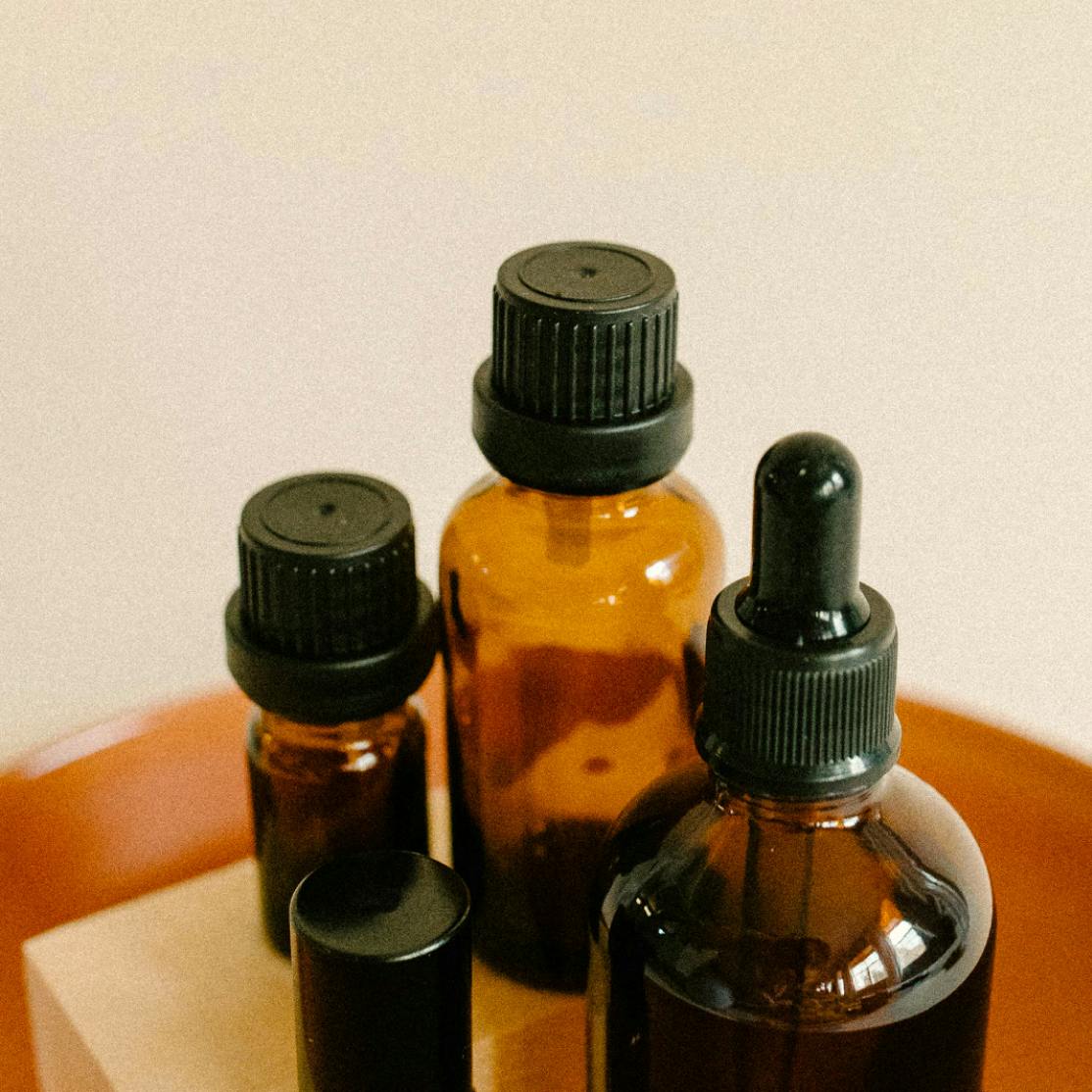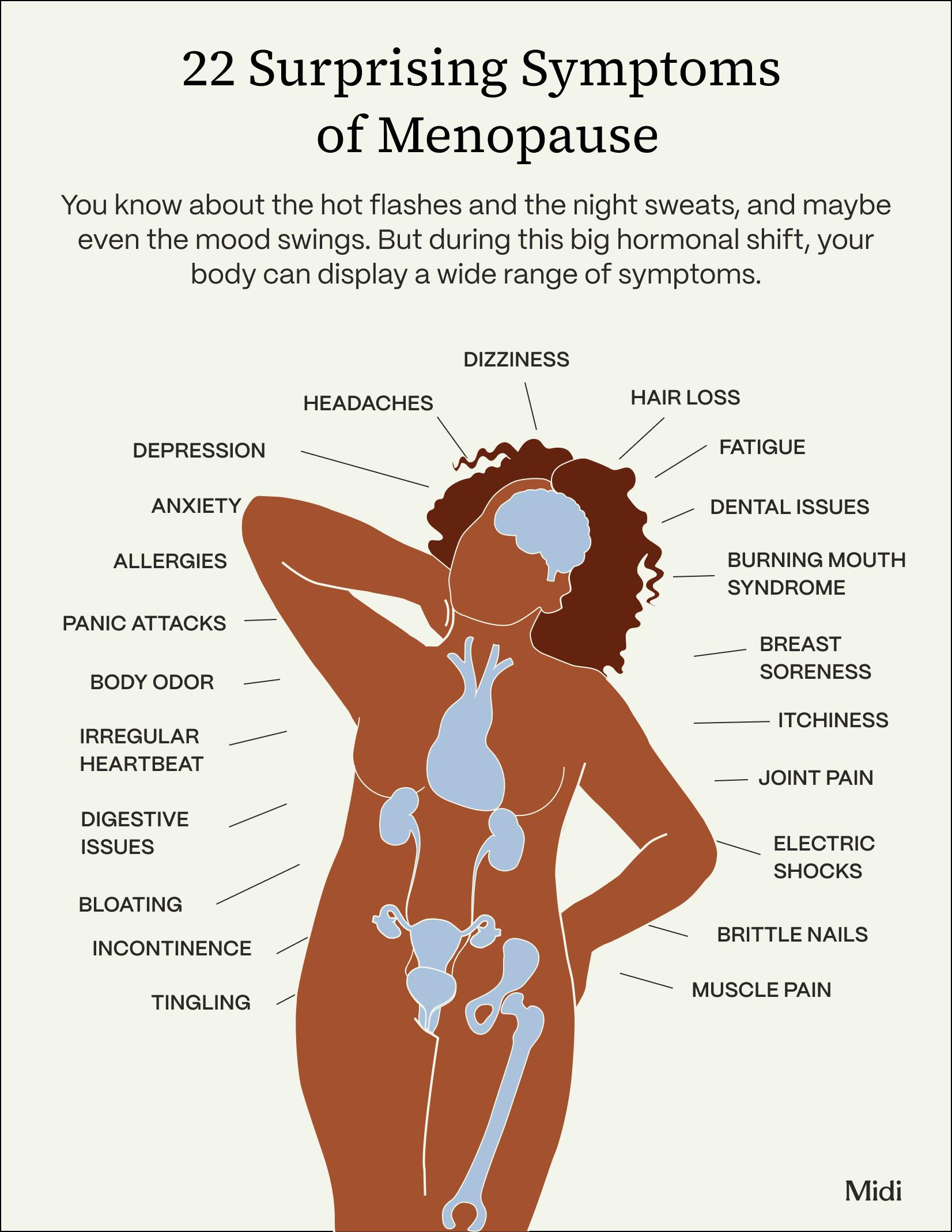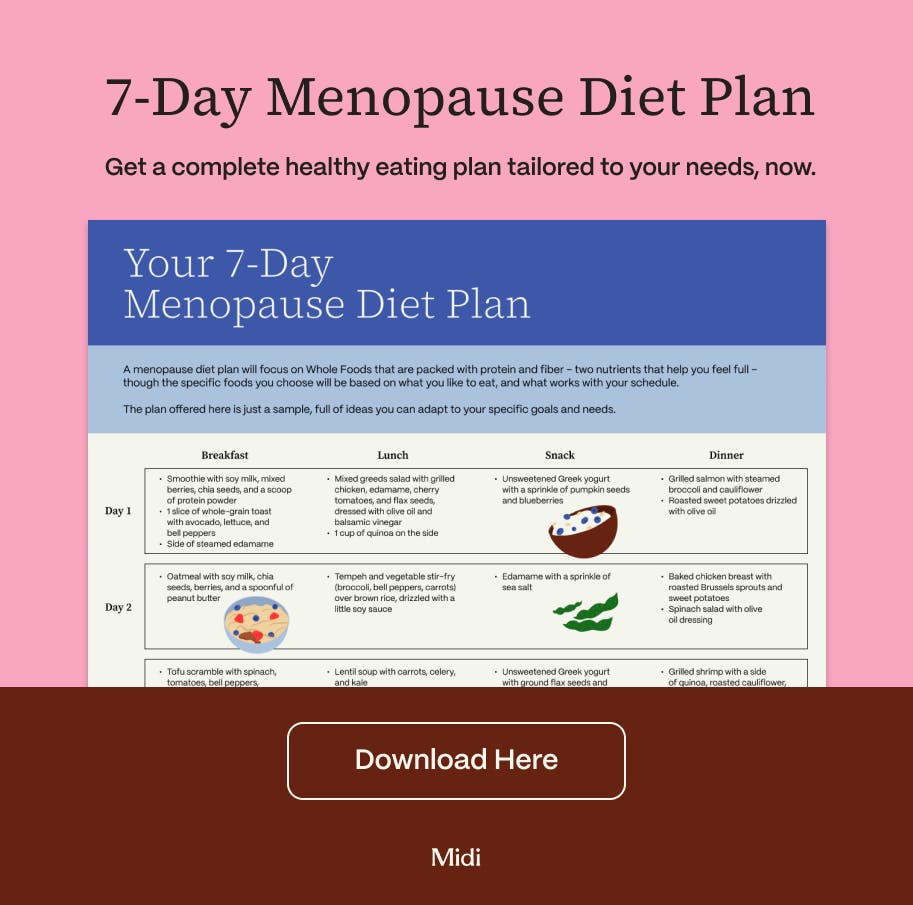As women approach midlife, menopause often arrives like an uninvited house guest who rearranges your thermostat, messes with your sleep, and puts your emotions on a roller coaster that would make even theme park enthusiasts queasy. While hormone replacement therapy remains a standard treatment, many women are exploring alternative approaches, with CBD for menopause becoming an emerging category in the wellness space. But does CBD, a cannabis-derived compound, actually help with menopause symptoms, or is it just another trend that’s all hype? Here, we’ll dive into what the science says about CBD for menopause. And remember: When it comes to menopause symptoms, you don’t need to white-knuckle your way through it. Working with a menopause specialist, like a Midi clinician, is always a better way to relief.
Understanding Menopause and CBD
Menopause marks the end of a woman's reproductive years, typically occurring between ages 45 and 55—nature's way of closing up shop, so to speak. This natural biological process involves dramatic hormonal changes, particularly a decline in estrogen, which can trigger various physical and emotional symptoms that can have a major impact on quality of life.
Meanwhile, CBD (cannabidiol) has stepped into the spotlight. Unlike its cousin THC, it doesn't cause a "high." Instead, it interacts with the body's endocannabinoid system—a complex cell-signaling network that sounds like something from a sci-fi movie but is actually responsible for regulating sleep, mood, pain sensation, and immune function—all things you might need help with during the perimenopause years.
“We know that CBD gives health benefits like reduced inflammation, muscle relaxation, and pain management,” says Kathleen Jordan, MD, Chief Medical Officer at Midi Health.
And more women are using it or considering doing so: A 2020 survey reported at a meeting of The Menopause Society found that approximately 27% of women reported using or considering cannabis products (including CBD, which does not contain THC) to manage menopause symptoms, suggesting growing interest in this approach despite limited clinical evidence.
How Menopause Affects the Body
When estrogen levels drop during menopause, women commonly experience:
- Hot flashes and night sweats
- Sleep disturbances
- Mood changes and anxiety
- Joint pain and inflammation
- Decreased bone density
- Vaginal dryness and discomfort
These symptoms can last anywhere from a few months to several years, varying widely from one woman to the next. While some women navigate this transition with minimal disruption (how lucky!), many women experience significant challenges that benefit greatly from intervention.
CBD and the Endocannabinoid System (ECS)
We’re going to get a little technical here, but for good reason. Understanding what’s happening in your body can help explain why CBD may be one option in your menopause toolkit.
Your body’s endocannabinoid system (ECS) plays a crucial role in maintaining balance, or homeostasis—think of it as your body's internal project manager, who tries to make sure everything runs smoothly while dealing with hormonal executives who keep changing their minds.
Research has revealed intriguing connections between the ECS and female reproductive health, suggesting that this system may influence hormonal regulation. This raises the question about the impact of the ECS on menopausal symptoms. Supplementing with plant cannabinoids like CBD may help activate the body's natural endocannabinoid system and support its many benefits throughout the body.
CBD interacts with ECS receptors throughout the body, “potentially modulating processes related to inflammation, pain perception, mood regulation, and sleep—all areas affected during menopause,” says Dr. Jordan. While not directly replacing hormones, CBD may help address the downstream effects of hormonal changes.
Benefits of CBD for Menopause Symptoms: What the Research Says
Research on CBD specifically for alleviating menopause symptoms is still very much emerging, with many studies focusing on individual symptoms rather than menopause as a whole. Most evidence comes from animal studies, laboratory research, and small human trials examining CBD's effects on conditions that overlap with menopause symptoms.
A 2022 Rutgers University study found that CBD showed health benefits in estrogen-deficient mice (their proxy for post-menopausal women), particularly in glucose tolerance (the body's ability to efficiently process and use sugar). While promising, these findings require validation in human trials.
Here, we’ll go symptom by symptom on where the research stands.
Mood Changes and Anxiety
Mood swings, irritability, and anxiety frequently accompany menopause as hormonal fluctuations affect neurotransmitter activity. One day you're fine, the next day you're contemplating whether it's legal to put your spouse in a storage unit for breathing too loudly. As many as 70% of women deal with emotional fluctuations through the menopause transition. That can include overwhelming reactions to everyday events, ranging from tears to full-blown rage. Another 25% of women notice increased mood swings that can range from mild to severe.
CBD's interaction with serotonin receptors may help stabilize mood and reduce anxiety symptoms. CBD for menopause-related mood shifts might work through similar mechanisms, though specific research on menopausal mood changes is limited. “Some women report subjective improvements in emotional well-being when using CBD products during menopause,” notes Dr. Jordan.
Sleep Disturbances and Insomnia
Difficulty sleeping affects 61% of menopausal women, and nearly 44% suffer from chronic insomnia—often exacerbated by night sweats. (Just like hot flashes, 75% of menopausal women experience night sweats and symptoms last five to seven years, or longer.) When your body decides that midnight is the perfect time to simulate life in the Sahara, quality sleep can become elusive. CBD may support better sleep through several pathways:
- Reducing anxiety that interferes with falling asleep
- Addressing pain that might disrupt sleep
- Potentially influencing sleep cycles directly
Research suggests CBD may help improve sleep quality and duration, with one study finding that nearly 67% of participants reported better sleep after taking CBD but it was highly dependent on the dose (with higher doses showing sedative properties in those with anxiety). For women experiencing menopause-related insomnia, this could translate to more restful nights but you'll need to make sure you're at an effective dose for you.
Hot Flashes and Night Sweats
The evidence for CBD and hot flashes is primarily anecdotal, with some women reporting reduced frequency and intensity of these common vasomotor symptoms. The theoretical basis lies in CBD's potential to regulate body temperature through interaction with serotonin receptors, which play a role in temperature regulation.
While clinical studies specifically examining CBD's effect on hot flashes are lacking, some women find relief when incorporating CBD products into their wellness routine.
Joint Pain and Inflammation
Estrogen helps regulate inflammation in the body, and its decline during perimenopause can contribute to increased joint pain and stiffness. CBD's anti-inflammatory properties, demonstrated in multiple studies, may help address this symptom.
By interacting with endocannabinoid receptors in immune cells, CBD appears to reduce inflammatory responses, particularly with arthritis. For women experiencing menopause-related joint discomfort, topical or oral CBD products might offer relief.
CBD and Sexual Health
There’s been little research into how topical CBD affects libido or sexual pleasure—but we know that topical CBD can increase blood flow to tissues, notes Dr. Jordan, who also says she’s talked to many patients who have found an increase in sexual pleasure by rubbing topical CBD cream on their vulva and clitoral areas before sex. (The fact that it can help relax muscles doesn’t hurt either, in terms of enjoying intimacy.) “Just don’t place it inside the vagina,” notes Dr. Jordan.
Choosing the Right CBD Product for Menopause
The expanding CBD market offers more options than a streaming service menu, each with advantages for different menopause symptoms.
Types of CBD Products
- CBD Oil: This is most often taken sublingually (you place drops under your tongue) for faster absorption or added to foods and beverages. Oils allow for flexible dosing and typically offer good bioavailability, “since they bypass the digestive system,” says Dr. Jordan.
- CBD Gummies: These appeal to those preferring a pre-measured dose with pleasant taste. Gummies for menopause can provide consistent dosing and convenience but may take longer to take effect as they go through the entire digestive system. (This means they can take several hours to kick in.) There are also capsules, although absorption varies based on your digestion.
- Topical CBD Products: These creams and balms can work well for localized symptoms like joint pain or muscle tension, with minimal systemic absorption, and can also help increase blood flow—something that can be helpful when it comes to improving your sexual experience, when rubbed onto the vulva area, says Dr. Jordan.
Factors to Consider When Buying CBD
The FDA has not approved CBD specifically for menopause symptom management. Most CBD products are marketed as supplements rather than medications, resulting in inconsistent regulation of quality and claims. When shopping for CBD products, quality matters significantly. Look for:
- Third-party testing: Reputable companies provide certificates of analysis from independent laboratories verifying cannabinoid content and confirming the absence of contaminants. If a company is more secretive about their test results, keep shopping.
- Full-spectrum vs. broad-spectrum vs. isolate: Full-spectrum CBD contains trace amounts of THC (usually around 0.3% or less, which typically isn’t enough to cause a “high” but can trigger a positive result on a drug test) and other cannabis compounds that may enhance CBD's effects. Broad-spectrum offers similar benefits without THC and can contain various beneficial compounds from the cannabis plant, like terpenes and other cannabinoids. Isolate is pure CBD without any other cannabis compounds added.
- Ingredient quality: Look for brands that feature organic hemp cultivation, clean extraction methods, and natural supporting ingredients.
- Local regulations: CBD legality varies by location, so verify your area's current laws before purchasing.
CBD Dosage and Safety Considerations
Finding the Right Dosage
CBD dosing lacks standardized guidelines, particularly for menopause symptoms. Most experts recommend starting with a low dose and gradually increasing while monitoring effects—a process called "start low, go slow." We recommend working with a menopause specialist, like a Midi clinician, on the right dosage for you when it comes to CBD for menopause.
Factors affecting optimal dosage include:
- Body weight
- Individual body chemistry
- Symptom severity
- Product concentration
- Delivery method (i.e. oil, gummy, capsule, etc)
Keeping a symptom journal can help track improvements and determine personal effectiveness.
Potential Side Effects
While generally well-tolerated, CBD may cause side effects in some individuals:
- Dry mouth
- Drowsiness or fatigue (potentially a bonus for insomnia sufferers)
- Digestive changes like nausea and vomiting
- Reduced appetite
- Potential medication interactions
CBD can affect how the liver processes certain medications, including some blood pressure medicines, cholesterol medications and many others. This is sometimes referred to as the “grapefruit effect,” and it means CBD might increase or decrease medication levels in the bloodstream, so check with a healthcare professional before combining them.
Alternative and Complementary Approaches
CBD vs. Hormone Replacement Therapy (HRT)
Hormone replacement therapy (also referred to as menopausal hormone therapy) remains the most effective treatment for many perimenopause and menopause symptoms, especially moderate to severe hot flashes.
For women who cannot or choose not to use HRT due to health concerns or personal preference, “CBD may offer a complementary approach. Many women find good results when combining multiple strategies,” notes Dr. Jordan.
Lifestyle Modifications for Menopause Symptom Relief
CBD works best as part of a comprehensive approach to managing menopause, including:
- Regular physical activity
- Stress management techniques
- Nutritious diet rich in foods that can fight hot flashes
- Good sleep hygiene
- Limiting alcohol and caffeine
- Avoiding smoking
These foundational practices can enhance any menopause management strategy, whether it includes CBD, HRT, or other approaches.
Common CBD Mistakes to Avoid
Not Consulting a Healthcare Professional
While CBD is available without prescription, discussing its use with a healthcare professional, like a Midi clinician, familiar with your health history is crucial. This conversation becomes especially important if you:
- Take other medications
- Have underlying health conditions
- Are considering replacing prescribed treatments
A knowledgeable provider can help integrate CBD appropriately into your menopause management plan. Plus, they've heard it all before, so no need to feel embarrassed about any symptom discussions.
Incorrect Dosages and Misuse
Expecting immediate results or taking inconsistent amounts can lead to disappointment with CBD or even discomfort. “Listen to your body and how it reacts,” says Dr. Jordan. “If you are someone who experiences nausea, for instance, take note of that and share it with your clinician.” Establishing a consistent routine and allowing sufficient time (often several weeks) for effects to develop provides a more accurate assessment of benefits. And be prepared to gradually adjust the dose to achieve optimal results.
Key Takeaways
- CBD shows promise for addressing several menopause-related symptoms, including anxiety, sleep issues, and joint pain.
- Scientific research specifically on CBD and menopause remains preliminary, with most evidence coming from studies on individual symptoms and anecdotal cases.
- Different CBD products (oils, gummies, topicals) may address specific menopause concerns more effectively, like a CBD cream for vaginal dryness.
- Quality, dosage, and individual factors significantly influence outcomes when using CBD for menopause relief, so it’s best to consult with a healthcare professional
- CBD works best as part of a comprehensive approach to menopause management rather than as a standalone solution.
Frequently Asked Questions (FAQs)
Does CBD increase estrogen levels?
Current research doesn't indicate that CBD can directly increase estrogen levels. Instead, it may help manage symptoms resulting from estrogen decline. Think of it as a symptom manager, not a hormone replacement.
What is the best relief for menopause?
Hormone replacement therapy remains the most effective treatment for multiple menopause symptoms, particularly hot flashes and vaginal dryness. For those seeking non-hormonal options, approaches combining lifestyle modifications, targeted supplements, and possibly CBD may provide relief.
What is the best natural hormone replacement for menopause?
There is no one “natural” hormone replacement out there, but there are certain foods you can focus on that may help squelch hot flashes. Take, for instance, soy. The isoflavones in soy are plant estrogens that may mimic the estrogen in our bodies. In one small study, women who followed a low-fat, vegan diet and ate 3 ounces of soybeans daily for 12 weeks reported fewer total hot flashes compared to a control group that ate their usual diet. Those in the soybean group nearly eliminated their moderate-to-severe hot flashes.
What does CBD do for menopause?
CBD potentially addresses menopause symptoms by supporting your body’s endocannabinoid system, which helps regulate mood, sleep, pain perception, and inflammation—all areas that can be trouble spots during the menopause transition.
If you’re in perimenopause or menopause and want guidance from clinicians who specialize in women’s midlife health, book a virtual visit with Midi today.
Hormonal change is at the root of dozens of symptoms women experience in the years before and after their period stops.
Our trained menopause specialists can help you connect the dots to guide you towards safe, effective solutions.
Whether you need personalized guidance or a prescription routine to tackle symptoms—including vaginal dryness and irritation, brain fog, hot flashes, sleep trouble, mood swings, and weight gain—we’ve got you covered.
Midi’s mission is to revolutionize healthcare for women at midlife, wherever they live and whatever their health story. We believe that starts with education, to help all of us understand our always-changing bodies and health needs. Our core values guide everything we do, including standards that ensure the quality and trustworthiness of our content and editorial processes. We’re committed to providing information that is up-to-date, accurate, and relies on evidence-based research and peer-reviewed journals. For more details on our editorial process, see here.
 Liz Krieger
Liz Krieger








